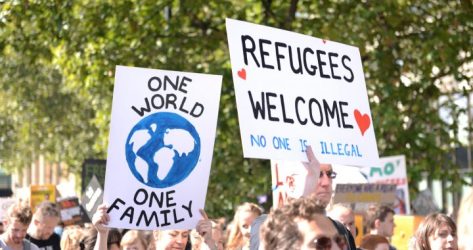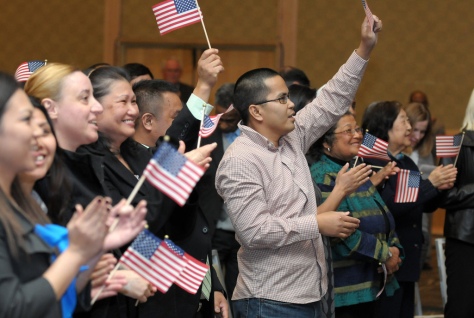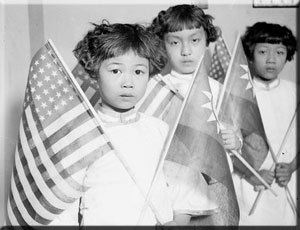Roxana Mogharrabin
Unfortunately, many immigrants are the subject of hate crimes because of their nationality. Following the 9/11 tragedy, “immigrant communities of color, primarily Muslims, Arab Americans, East Africans and South Asians” (OneAmerica) were the subject of extreme hate crimes leading to the establishment of OneAmerica. As a country that promotes freedom, diversity, and acceptance of all people, we often fail to follow through with our values. Because of the way our nation is today, to stand for what is right, we must organize and practice advocacy because without fighting for what we believe is right, we won’t be able to move forward and become a better version of ourselves. Day in and day out we hear conversations about individuals having the power to make a change, but to do so, we first need to understand what power is and how individuals contribute to a change. According to Dworkin & Dworkin, 1999, “power is the actual use of resources to influence and control others”. To answer the second part of our question, we connected with Pavan Vangipuram, the Communication manager of our community partner, OneAmerica.

With their main mission being “advancing the fundamental principles of democracy and justice at the local, state, and national levels by building power within immigrant communities”, OneAmerica advocates for immigrant, civil and human rights. According to Pavan, OneAmerica’s power comes from their base which is motivated people who are willing to be civically engaged, participate in meetings that eventually help take issues refugees and immigrants experience beyond state level, to national level which means sending delegations to Washington DC and connecting with our congress people. Because of the power of individuals coming together and using their resources to create allies and connections, OneAmerica can advocate for policies and programs that benefits, supports, and protects the immigrant community.

Through the power civic engagement, mostly immigrants, some already American citizens and some in the process of becoming one, OneAmerica has been able to expand their values of immigrant empowerment to other communities and getting them involved as well. The outreach to outside communities allows OneAmerica to provide more opportunities for immigrants to receive assistance on the citizenship in addition to providing support and protecting them from hate crimes they might experience because of their ethnicity and religion.

In Amusing Ourselves to Death Postman explains how our daily news consists of information that gives us something to talk about but cannot lead to any meaningful action. By generating an abundance of irrelevant information, the “information-action ratio” is dramatically altered (Postman, 1985, pg.68). We like to believe that our media today is not bias and presents every aspect of an issue, but, most of our news outlets only provide enough information to attracts viewers, but not enough to make the viewer think past the surface of the issue, and certainly not enough to make the viewer to act and be part of the solution/change. By using their community allies and other resources, OneAmerica provides both information and opportunities such as meetings, events, workshops, and protests for people to be part of a solution regarding current issues immigrants face.

In the chapter “Searching for Gold Mountain” of A different Mirror, we can see the similarity between the issues immigrants faced in the 1800s and the issues they face today. Chinese immigrants were denied citizenship for over 10 years because citizenship status was only granted to white people, but “the Chinese fought the discrimination…and took their struggle to the civil rights court (Takaki, 2008, pg.190). Eventually they succeeded, and citizenship was granted to everyone. Once again, this example by Takaki shows the success/change that comes from the power of people combing forces and sources to fight for the same beliefs. But seeing the similarities, perhaps some of our beliefs and values have not changed since the 1800s. according to the Black’s Laws Dictionary belief is defined as “A conviction of the truth of the proposition, existing subjectively in the mind, and induced by argument, persuasion, or proof addressed to the judgment” (Pg. 125) and according to Rokeach (1968), values are strong convictions about what is right or wrong. Based on these definitions, I believe our values have somewhat stayed the same—that is we still value skin color more than the contribution of an individuals to our community. One America uses the voice of its members and allies there is more attribution to immigrants than their race, religion, and citizenship status.

OneAmerica shows the power of individuals coming together can be much greater than one would think. Like Pavan mentioned in his interview, each person can be a part of something greater, so use your voice and help people feel as included as you would want to feel. OneAmerica has used its community base power to perhaps create new values and beliefs for the surrounding non-immigrant communities, in addition to creating new perceptions on immigrants and issues they face, as most of the members of the organization are either immigrants themselves or are the children of immigrants. I believe we all have the power to be part of something greater. We should use the opportunities we are given to promote our values of freedom, diversity, and acceptance of all people because after all we are all branches of the same tree. The color of our skin and our religion should not create a difference between us. Moreover, going back to the tragedy of 9/11, we should realize the actions of a few people does not define a whole community.
References
Garner, Bryan A., and Henry Campbell Black. Blacks law dictionary. 2nd ed., Thomson Reuters, 2016
“OneAmerica.” Home Page | OneAmerica, weareoneamerica.org/. Accessed 11, Feb. 2018
“One America Photos.” Flickr, Yahoo!, 2009, http://www.flickr.com/photos/oneamerica/albums/with/72157626282186321. Accessed 11, Feb. 2018
Ortiz, David. “Lecture Two: Power” Canvas, https://cascadia.instructure.com/courses/1541589/pages/lecture-slash-discussion-power?module_item_id=26640069. Accessed 11, Feb. 2018
Ortiz, David. “Lecture Four: Values and Beliefs.” Canvas, https://cascadia.instructure.com/courses/1541589/pages/values-and-beliefs?module_item_id=26798696. Accessed 11, Feb. 2018
Postman, Neil. Amusing ourselves to death: Peek-a-Boo World. Methuen, 2007.
Sutherland Serena, and Pavan Vangipuram. “Interview transcript.” 11 Feb. 2018.
Takaki, Ronald. A Different Mirror: A History of Multicultural America. Little, Brown and Company, 1993.
